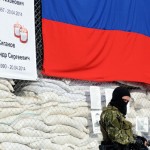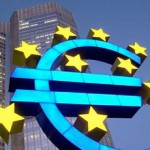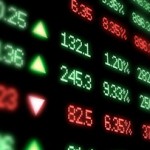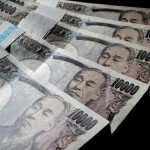Europe Stock Futures Follow Asia Down on Tech; Lira Falls
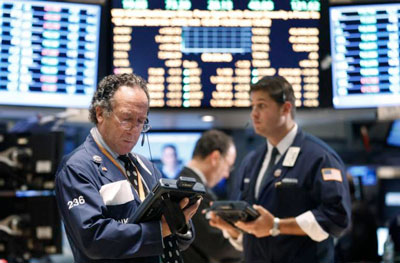
European index futures and emerging-market currencies slid as a gauge of Asian stocks dropped the most in three weeks amid a selloff in technology shares that’s cut demand for riskier assets. Nickel extended its longest rally since 2010.
Contracts on the Euro Stoxx 50 Index sank 0.8 percent by 7:12 a.m. in London. The MSCI Asia Pacific Index slid 1 percent with Tencent Holdings Ltd., China’s biggest internet company, leading declines, followed by Japan’s Softbank Corp. and South Korea’s Samsung Electronics Co. Standard & Poor’s 500 Index futures were little changed. The yen and gold held gains as currencies from Australia to Turkey weakened. Nickel climbed a 10th day as the prospect of further sanctions against Russia added to supply concerns.
Information technology and telecommunications stocks led today’s retreat after the Nasdaq Composite Index slid the most since 2011 yesterday in the U.S. amid concern that valuations aren’t justified. China’s inflation rate was 2.4 percent in March, while producer prices fell 2.3 percent, close to the 2.2 percent decline predicted by economists surveyed by Bloomberg. India is expected to show faster growth in factory output for February while Germany and Italy issue price data before a U.S. consumer confidence report.
“As market sentiment worsens in the U.S., investors tend to focus on negatives, creating a downward spiral,” said Juichi Wako, a Tokyo-based equity strategist at Nomura Holdings Inc., the nation’s biggest brokerage. “We’re seeing a necessary correction in technology shares.”
Index Valuations
The MSCI Asia Pacific Index is down 1.1 percent this week, while Japan’s broader Topix index slumped 6.7 percent, the biggest weekly drop since June. Asia-Pacific gauge stocks trade at 13.6 times company earnings, compared with a valuation of 35 for the Nasdaq Composite and a multiple of 16.9 for the S&P 500, which sank 2.1 percent to an almost two-month low yesterday. The MSCI All-Country World Index trades at 16.8 times earnings, data compiled by Bloomberg show.
Softbank Corp., the mobile operator that’s the second-heaviest company in the Nikkei 225 Stock Average, is down 13 percent this week. Fast Retailing Co., Asia’s biggest clothing retailer and the stock with the largest weighting on the Nikkei 225, sank 7.9 percent today, headed for a 13 percent loss for the week. The company cut its annual profit forecast late yesterday amid rising costs and weakening demand for casual wear.
Nikkei 225
The Nikkei 225 fell 7.3 percent in the week, the worst performance among 24 developed markets tracked by Bloomberg, while the Hang Seng Index in Hong Kong has the biggest increase among the 24 markets. Samsung Electronics slid 1.1 percent, dragging the Kospi index to a 0.6 percent drop, while New Zealand’s Xero ltd., an accounting software company that jumped 325 percent last year, fell 5.3 percent.
Tencent dropped 5.5 percent in Hong Kong, with declines by the operator of the WeChat mobile messaging platform dragging the Hang Seng Index to a 0.5 percent loss. Hong Kong Exchanges & Clearing Ltd. jumped 11 percent amid speculation the bourse operator will benefit most from a plan to link China’s two largest share-trading venues. The Hang Seng China Enterprises Index dropped 1.7 percent, led by insurers and banks.
China’s producer-price index retreated following the previous month’s 2 percent drop, as the government seeks to shore up growth with spending on railways and tax relief for small businesses. Data yesterday showed exports from China fell 6.6 percent in March, with economists expecting a gain of 4.8 percent. Imports dropped 11.3 percent after rising 10.1 percent in February.
German CPI
Germany reported final inflation of 0.1 percent in March from a year earlier today, while in the U.S., producer prices and the University of Michigan survey of consumer confidence in April are due.
The yen weakened to 101.79 per dollar after climbing 0.5 percent in the last session. Japan’s currency has strengthened 1.4 percent this week, posting the biggest advance among 10 Asian currencies tracked by Bloomberg.
Australia’s dollar weakened 0.4 percent with New Zealand’s currency down 0.2 percent today, while Malaysia’s ringgit and the Thai baht dropped at least 0.3 percent. Turkey’s lira slid 0.5 percent to 2.1173 per greenback as Moody’s Investors Service cut the country’s credit outlook.
Russia’s ruble weakened 0.3 percent to 35.6705 a dollar and dropped 0.5 percent in a fifth straight loss versus the euro to 49.5693. The Micex Index retreated 1.5 percent.
The U.S. threatened Russia with more sanctions for its incursion into Ukraine as global finance chiefs debated how best to deliver aid to the beleaguered former Soviet republic. World Bank President Jim Yong Kim said yesterday that a prolonged crisis could cause the Russian economy to shrink as much as 1.8 percent this year.
Double Whammy
Nickel for three-month delivery on the London Metal Exchange added 0.9 percent to $17,236 a metric ton. amid concern global demand for the metal will exceed supply after Indonesia, the world’s biggest nickel supplier, barred unprocessed-ore exports, and as the U.S. and Europe consider further punishments for Russia’s actions in Ukraine.
“Everyone is on the same page that follows base metal markets,” Tom Price, a Sydney-based analyst at UBS, said in an interview with Angie Lau on Bloomberg Television today. “You’ve got two supply shocks.”
Copper climbed 0.3 percent while aluminum was little changed. Gold climbed 0.1 percent to $1,320.67 an ounce following a 0.6 percent advance yesterday. The precious metal is headed for a 1.3 percent gain this week, a second weekly climb.
Rupiah Rout
Indonesia’s rupiah lost 1 percent to 11,465 per dollar amid prospects presidential frontrunner Joko Widodo will need the support of minor parties to run as the main opposition candidate. Unofficial results of April 9’s parliamentary election showed the Jakarta governor, known as Jokowi, was shy of the votes needed to run for president on his own.
Claims for U.S. jobless benefits dropped to 300,000 last week, the least than at any time since before the last recession, data showed.
The Dow Jones Internet Composite Index sank 4.2 percent in the U.S. session and the Nasdaq Biotechnology Index plunged 5.6 percent, the most since 2011. Alexion Pharmaceuticals Inc. dropped 7.5 percent, the biggest slump in the S&P 500. The drugmaker, which trades at 101 times reported earnings, has lost 22 percent since closing at a record on Feb. 27.
Alcoa Inc. this week unofficially began the U.S. earnings season, recording quarterly profit that exceeded analysts’ estimates. Earnings for members of the S&P 500 probably climbed 1 percent in the first quarter, analysts now forecast, after anticipating a 6.6 percent increase in January.
Australian government bonds followed gains in U.S. Treasuries, with yields falling four basis points, or 0.04 percentage point, to 4.02 percent, set for a one-month low. Ten-year Treasury yields were little changed today at 2.65 percent after retreating four basis points in New York to the lowest close since March 13.
Source: bloomberg









